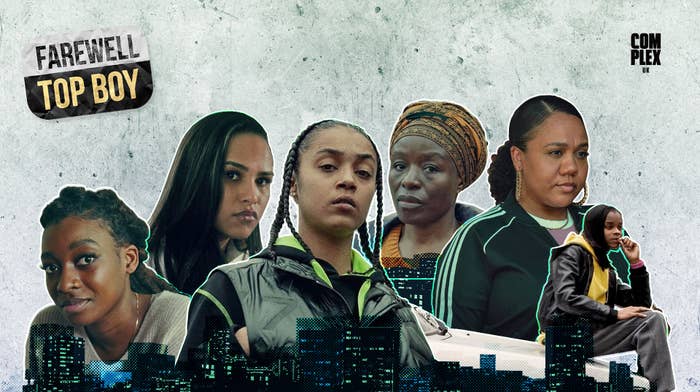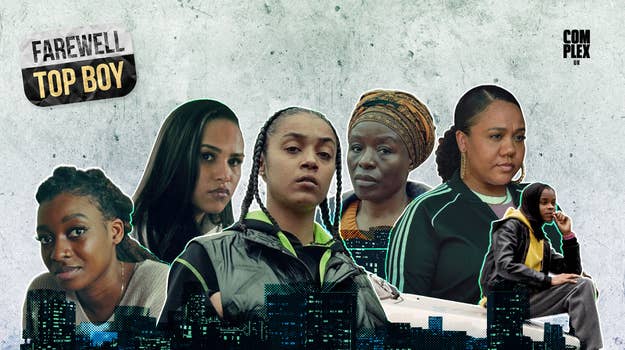
Last month, we said goodbye to one of Black Britain’s biggest television shows.
From its beginnings on Channel 4 to its Drake-produced Netflix revival, Top Boy played a massive role in representing a subsection of a world that once had limited representation. In addition to this, the crime drama series also helped propel some of today’s biggest British actors into stardom (see: Michaela Coel, Letitia Wright, Micheal Ward) and allowed beloved musicians to flex their acting muscles (see: Kano, Dave, Little Simz, NoLay).
Grasping even global audiences, Top Boy’s reach has been undeniable, but what often goes unspoken is the impact the women—both in the series and behind it—had on the success of the show. From its 2011 inception, we’ve seen how women guide the plot of Top Boy. Actress Sharon Duncan Brewster played Ra’Nell’s mum, Lisa, exquisitely, displaying the harrowing realities many in London and beyond experience. Playing a struggling single mum battling with mental health issues and the imminent impact of gentrification, this character offered a window into a truth that continues to plague many today.
This, in part, is what leads to a young Ra’Nell’s involvement in the East London drug scene, introducing us to the dark world being led by Dushane and Sully. Later in the series, we also see another angle of how mothers are impacted by gang culture, this time through the lens of Ats’ mum, Amma Ayittey, played by Jolade Obasola.
Here, a young teenager changes before his mother’s eyes after seeing her made redundant following issues with immigration. This was particularly pertinent given the ongoing hostility of the Home Office against immigrants, regardless of the number of years lived in the UK or the many contributions made to society. Ultimately, Ats’ involvement leads to his death and later, Amma’s concession to deportation—both events mirroring the harsh realities faced by many immigrants and their children.
“What I love is that Top Boy is reflective of the women that we see in everyday life,” says DJ/presenter Henrie Kwushue. “Those who are doing what they can to get by; mothers who are doing their best but don’t really know what their children get up to; women who are in the thick of it, raised by the same roads the men are. They shape the series as they do in the real world, which more often than not is to aid their male counterparts, and sometimes even to their own detriment. With what each woman goes through in the series, no matter how big or small their role is, it soberingly reminds you why people say, ‘This is a man’s world.’”
We’ve also seen the other varying ways in which womanhood is represented through the series. In the past two seasons, this has been expressed on opposite sides of the spectrum through sisters Jaq (Jasmine Jobson) and Lauryn (Saffron Hocking). Level-headed, stern and loyal (ish), Jaq is sure to keep the boys grounded in Dushane and Sully’s place, even physically exiling her own sister following the discovery of her (accidental) disloyalty.
“Without these roles, the external factors that influence the stories that have gripped us so tightly over the past four seasons are contextless and would be less rich as a result.”
In the final season, we see Jaq at a crossroads, questioning the ethics of the only world she’s ever known. While we see main characters Sully and Dushane question leaving the game, it is usually from a point of self-interest; Jaq, however, has this epiphany after seeing the impact of drugs on those both internally and externally of her personal life. Here, Jasmine performs Jaq at her finest as she battles grief and internal turbulence.
Similarly, we see Saffron Hocking play Lauryn—resident liability—incredibly well. Frustrating audiences since 2019, her character evolved to tackle a range of issues: from domestic abuse and postpartum depression to addiction, the significance of Lauryn to the central plot points cannot be understated. In her second season especially, we saw her find strength and independence as she moved from casualty to survivor. Although we see significantly less of Lauryn in the final season, Saffron still displays a masterclass in the execution of a character that can evoke raw emotion, whether annoyance or sympathy, from a range of audiences.
Without these roles, the external factors that influence the stories that have gripped us so tightly over the past four seasons are contextless and would be less rich as a result. “The women in Top Boy have had a profound impact on the series by contributing diverse perspectives and powerful storylines,” remarks renowned director Simon Frederick. “Their presence has added depth and complexity to the narrative, shedding light on the challenges, aspirations and resilience of female characters within the gritty world of the show. These women have not only influenced character dynamics but have also been instrumental in driving key plot developments, often serving as catalysts for change.” Fredrick adds that “through their stories, the Top Boy series becomes a more inclusive and compelling exploration of life in the urban landscape, showcasing the multifaceted roles and strengths of women in this complex world.”
The women of Top Boy cannot be discussed without highlighting those behind the scenes who brought these characters to life. “What’s great about Top Boy is the crew is incredibly young and incredibly diverse,” says Myriam Raja, the final season’s lead director. “We had great women behind the camera. We had Alex Toomey, the production designer, Shahnaz Dulamy, the editor—both women whom I worked very closely with—and so many more. What’s amazing is I never stepped on set and felt intimidated, which isn’t easy when you’re a woman of colour. You second-guess yourself, but I never felt that on Top Boy. [The show] shines because of its women; they are the pillars around which the rest of it is built.”
Now, we bid Summerhouse adieu and although this appears to be the end of the road, the legacy it has left on the world of British TV is immortal. So, to the women of Top Boy—thank you; you helped build the foundation of a story that truly made history.

